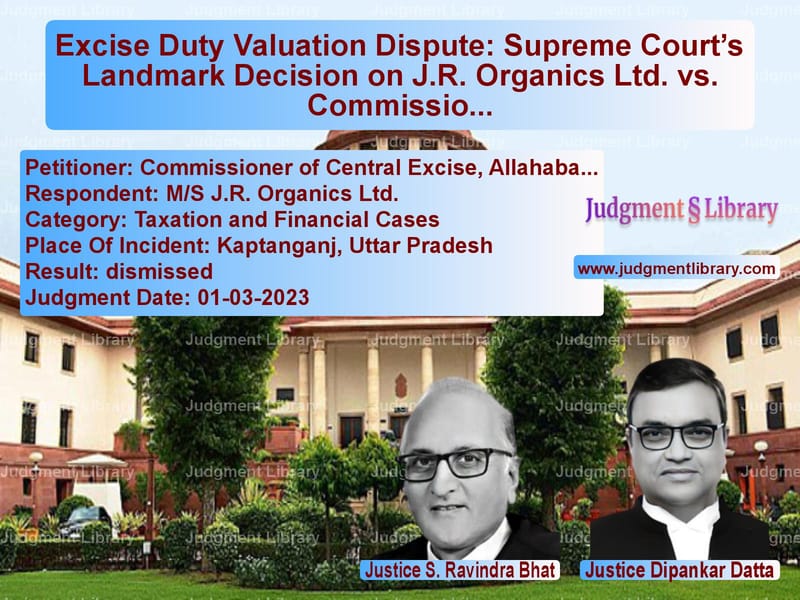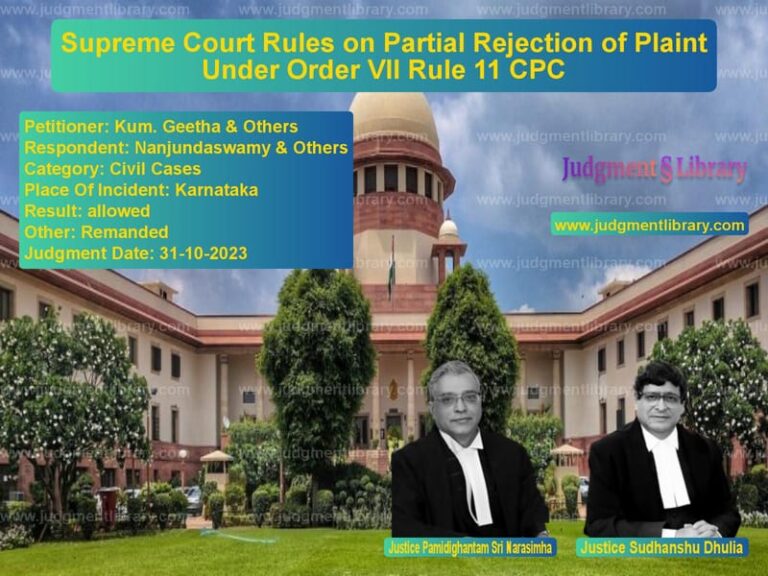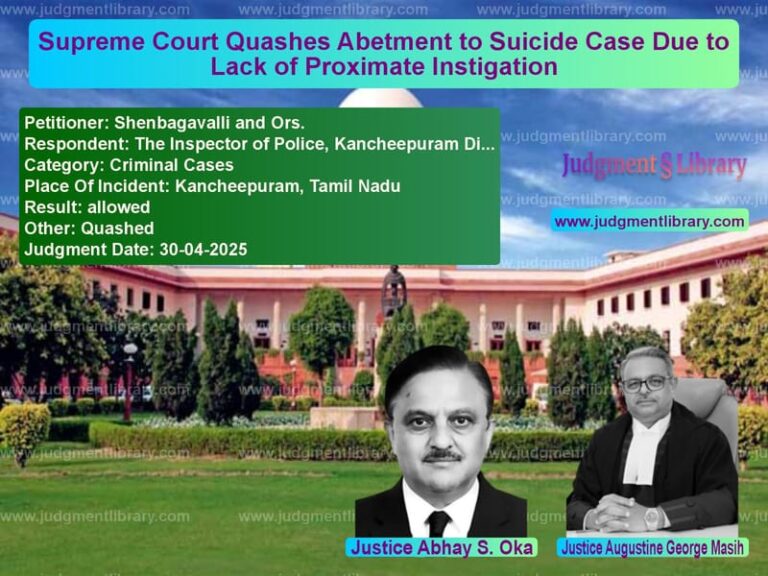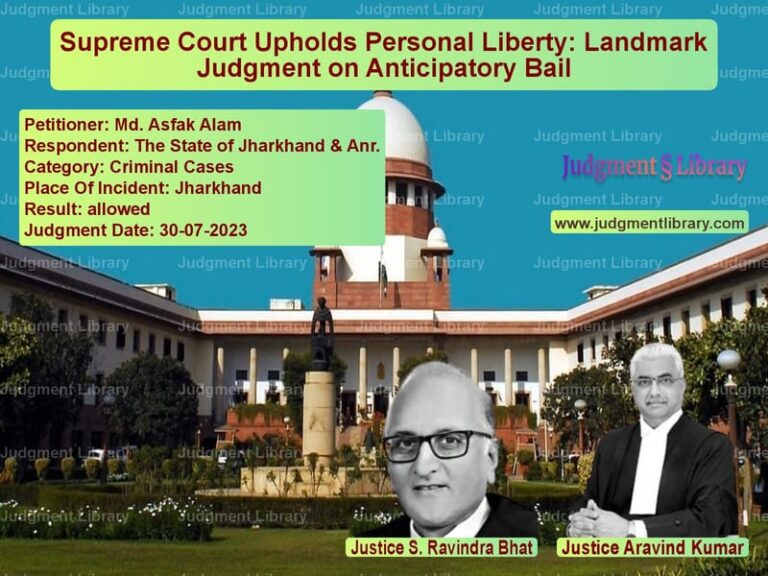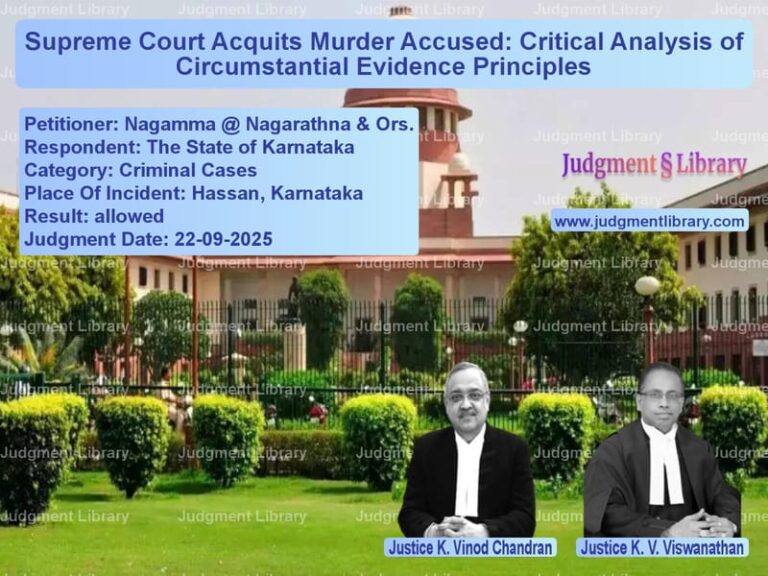Excise Duty Valuation Dispute: Supreme Court’s Landmark Decision on J.R. Organics Ltd. vs. Commissioner of Central Excise
In the case of Commissioner of Central Excise, Allahabad vs. M/S J.R. Organics Ltd., the Supreme Court delivered a crucial judgment regarding excise duty valuation under the Central Excise Act. This case, which originated from an appeal against the order of the Customs, Excise, and Service Tax Appellate Tribunal (CESTAT), revolved around the valuation method of Specially Denatured Spirits (SDS) used in manufacturing.
Background of the Case
M/S J.R. Organics Ltd. is engaged in the manufacture of industrial chemicals and operates from Kaptanganj, Uttar Pradesh. The dispute arose when the Commissioner of Central Excise assessed the valuation of SDS using the highest market price recorded at a different unit, rather than the in-house production cost. The department issued three separate show cause notices:
- April 1994 to February 1999: Excise duty demand of Rs. 14.59 crore.
- March 1999 to July 1999: Additional duty demand of Rs. 25.12 lakh.
- August 1999 to December 1999: Duty demand of Rs. 4.99 lakh.
Arguments by the Petitioner (Revenue)
The revenue department argued that:
- The valuation of SDS should be based on the highest price recorded in the open market.
- Since the assessee had not provided detailed cost records, the Commissioner had the authority to use comparable pricing from similar industrial units.
- Under Rule 7 of the Central Excise Valuation Rules, the price of identical or similar goods should be used when there is no proper transaction value available.
The department maintained that valuation based on production cost alone would lead to revenue loss and underreporting of excise duty.
Arguments by the Respondent (J.R. Organics Ltd.)
The respondent challenged the revenue’s assessment, arguing that:
- Valuation should be based on in-house production cost rather than the highest recorded market price.
- Comparing SDS prices from a different region with different operational costs was unreasonable and led to an inflated assessment.
- The Commissioner had failed to consider volume discounts, captive consumption, and other relevant factors that affected pricing.
- CESTAT had correctly ruled in their favor by rejecting the highest market price method.
Tribunal’s Decision and Supreme Court’s Remand
CESTAT, in its initial ruling, agreed with J.R. Organics Ltd. and held that valuation should be based on the transaction value at the time of removal. The department then approached the Supreme Court, which remanded the matter back to CESTAT for reconsideration. Upon reconsideration, CESTAT reaffirmed its ruling and held:
“The price at which goods are ordinarily sold in the wholesale trade is the normal price under the law. Taking the highest price as the representative price violates the principles of excise valuation.”
Supreme Court’s Final Judgment
After reviewing the arguments, the Supreme Court ruled in favor of J.R. Organics Ltd. The Court emphasized that excise duty should be based on the realistic value of goods and not an inflated estimate. The judgment referenced key precedents, including:
- A.K. Roy v. Voltas Ltd. – “Valuation must represent the fair and conservative price of goods at the time of removal.”
- Union of India v. Bombay Tyres International Ltd. – “Excise duty is a levy on manufacture and must be determined in accordance with production costs and normal transaction value.”
The Court ruled that:
“Adopting the highest recorded price as the valuation base is legally untenable. The Commissioner’s valuation method results in an arbitrary and excessive excise duty assessment, which must be set aside.”
Key Takeaways from the Judgment
- Excise duty must be determined based on transaction value and not arbitrary market prices.
- The highest market price method violates the principles of fairness and neutrality in taxation.
- CESTAT’s approach was correct in rejecting the revenue’s methodology.
- The appeal by the revenue was dismissed.
Conclusion
The Supreme Court’s ruling in this case reinforces the need for a rational and fair approach in excise valuation. By upholding CESTAT’s decision, the Court has protected manufacturers from arbitrary tax assessments that could lead to excessive financial burdens. This judgment serves as an essential precedent in taxation law and ensures that valuation principles adhere to economic reality.
Petitioner Name: Commissioner of Central Excise, Allahabad.Respondent Name: M/S J.R. Organics Ltd..Judgment By: Justice S. Ravindra Bhat, Justice Dipankar Datta.Place Of Incident: Kaptanganj, Uttar Pradesh.Judgment Date: 01-03-2023.
Don’t miss out on the full details! Download the complete judgment in PDF format below and gain valuable insights instantly!
Download Judgment: commissioner-of-cent-vs-ms-j.r.-organics-lt-supreme-court-of-india-judgment-dated-01-03-2023.pdf
Directly Download Judgment: Directly download this Judgment
See all petitions in Income Tax Disputes
See all petitions in GST Law
See all petitions in Tax Evasion Cases
See all petitions in Banking Regulations
See all petitions in Tax Refund Disputes
See all petitions in Judgment by S Ravindra Bhat
See all petitions in Judgment by Dipankar Datta
See all petitions in dismissed
See all petitions in supreme court of India judgments March 2023
See all petitions in 2023 judgments
See all posts in Taxation and Financial Cases Category
See all allowed petitions in Taxation and Financial Cases Category
See all Dismissed petitions in Taxation and Financial Cases Category
See all partially allowed petitions in Taxation and Financial Cases Category

